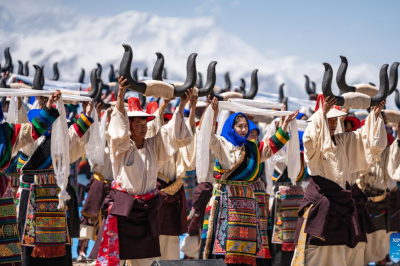| Editor's note: Qiao Basheng, a special commentator on current affairs for CGTN, is a researcher at the Research Center for External Publicity and Cultural Security, the School of National Security and the Human Rights Research Center, Northwest University of Political Science and Law. The article reflects the author's opinions and not necessarily those of CGTN.
The signing of the Agreement of the Central People's Government and the Local Government of Xizang on Measures for the Peaceful Liberation of Xizang (the 17-Article Agreement) on May 23, 1951, marks the people of Xizang breaking free from the fetters of invading imperialism for good, embarking on a bright road of unity, progress and development with all the other ethnic groups in China. Over the past 73 years, under the strong leadership of the Communist Party of China (CPC), the people of all ethnic groups in Xizang have worked together to forge ahead. Xizang's economy and society have achieved leapfrog development, and great changes have taken place in people's living standards and spiritual outlook. For centuries, Xizang was ruled by feudal serfdom under theocracy. But after democratic reform in 1959, the serfdom under theocracy in Xizang was abolished completely, bringing fundamental changes to the Xizang's social system and liberating about one million serfs who gained personal freedom and became masters of the new society. It was a historic leap that laid a solid foundation for the establishment of socialism in Xizang. In September 1965, the First Session of the First People's Congress of Xizang was held. At this session, the Xizang Autonomous Region was established, and the People's Committee of the autonomous region came into being by election. A large number of liberated serfs held leading posts in organs of political power at various levels of the region. This marked Xizang had transformed from theocratic feudal serfdom to people's democratic socialism, and signified that the region had set up a people's democratic government and begun to exercise thorough-going regional ethnic autonomy. The founding of the Xizang Autonomous Region and the adoption of the socialist system provided a guarantee for the realization of ethnic equality, solidarity, mutual help, and common development and prosperity in the region. It also created the conditions for all ethnic groups in Xizang to enjoy equal rights to participate in the administration of regional and state affairs. In this way, an institutional structure was put in place that would allow Xizang to develop along with other parts of China. Thanks to the leadership of the Central People's Government and strong support from the rest of China, and to the great endeavors of people of all ethnic groups in the region, Xizang is catching up with other parts of the country in terms of socioeconomic development and enjoying better opportunities and enormous potential. Over the last 73 years, the central government has introduced many favorable policies for the region, covering tax and finance, infrastructure, industrial development, education, health, cultural preservation, environmental protection, and other fields. The central government increases its fiscal transfer to Xizang every year, and has planned and carried out a number of major projects at different stages which have a bearing on the long-term development of the region and the living standard of the people. As a result, the local people enjoy much better working and living conditions, and their sense of gain, happiness, and security is growing. From 1994 to 2020, provincial-level regions, central government departments and centrally administered state-owned enterprises (SOEs) directly under the central government, provided support to Xizang in the form of pairing-up assistance through 6,330 projects, representing a total investment of 52.7 billion Chinese yuan ($7.43 billion). They also dispatched 9,682 cadres to the region. In 1951, Xizang's gross domestic product (GDP) was only 129 million yuan ($18.18 million), while its GDP exceeded 239 billion yuan ($33.67 billion) in 2023, a surge of more than 1,855 times. The economic structure has witnessed significant improvements due to substantial economic growth. As Xizang is a pivotal guarantor of China's environmental security, the Chinese government attaches great importance to eco-environmental protection there. It has been making constant efforts to improve institutions, providing strong scientific and cultural support, and increasing investment in eco-protection to build a community with a shared future for humanity and nature. Xizang's ecosystems are now generally stable with improved environmental quality, formed green development model, and improved eco-environmental rights and interests. Xizang has established 47 nature reserves of various types at various levels, covering a total area of 412,200 square kilometers, or more than one-third of the region's total land area. Xizang has become one of the regions with the best eco-environment in the world. The majestic Himalaya mountain range has witnessed great changes in Xizang since its peaceful liberation, and the torrential Yarlung Zangbo River played the magnificent symphony of Xizang's development and progress in the new era. Since the 18th Communist Party of China (CPC) National Congress, Xizang has experienced a period of unprecedented development and drastic change, bringing more tangible benefits to the people. Xizang's social and economic progress epitomizes the nation's outstanding achievements in development through Chinese modernization. Changes in Xizang during the past 73 years have fully demonstrated that local people's fundamental interests can only be protected in a unified country with territorial integrity. Only by upholding the leadership of the CPC, socialism with Chinese characteristics, and regional ethnic autonomy can there be long-term peace, stability and development in Xizang. Besides, by pursuing reform and opening-up, seeking people-centered development and following the Party's guidelines for governing Xizang in a new era, the region can build its economy and society, better meet local people's hopes for a better life, and be transformed into a modern and beautiful new socialist Xizang characterized by unity, prosperity, civility and harmony. (If you want to contribute and have specific expertise, please contact us at opinions@cgtn.com. Follow @thouse_opinions on X, formerly Twitter, to discover the latest commentaries in the CGTN Opinion Section.) |
- Home
- News Tibet |Exclusive |China |World |Related News |Latest
- Documents White Papers |Others
- Photo Politics |Economy & Society |Culture & Religion |Human & Nature |Beautiful Tibet |Other Tibetan-Inhabited Area |Exchanges |Related
- Video News |Documentary |Micro-Video |Entertainment
- Art
- Tourism
- In Focus
- About Tibet






